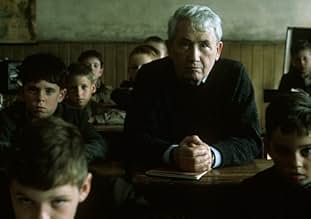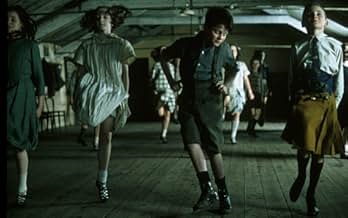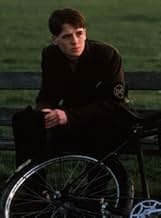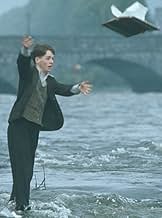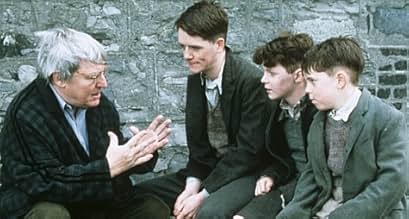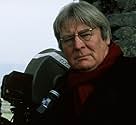Frankie e la sua famiglia cercano di sfuggire alla povertà nei bassifondi di Limerick prebellica. La famiglia si sistema a Brooklyn, ma dopo la morte di uno dei fratelli di Frankie, tornano ... Leggi tuttoFrankie e la sua famiglia cercano di sfuggire alla povertà nei bassifondi di Limerick prebellica. La famiglia si sistema a Brooklyn, ma dopo la morte di uno dei fratelli di Frankie, tornano a casa, ma lì la situazione è ancora peggiore.Frankie e la sua famiglia cercano di sfuggire alla povertà nei bassifondi di Limerick prebellica. La famiglia si sistema a Brooklyn, ma dopo la morte di uno dei fratelli di Frankie, tornano a casa, ma lì la situazione è ancora peggiore.
- Regia
- Sceneggiatura
- Star
- Candidato a 1 Oscar
- 5 vittorie e 12 candidature totali
- Narrator
- (voce)
- Young Malachy
- (as Shane Murray Corcoran)
Recensioni in evidenza
This is a very pure, almost sterile, adaptation of the original memoir "Angela's Ashes" by Frank McCourt. It chronicles vignettes in the family history of the McCourt's, a poor Irish Catholic family struggling to survive in early 20th century Ireland. The film, like the book, is stark, painful, hopeful, powerful, and deftly accurate. More than a period piece, this film works as a dramatic rendering of social history.
Unlike the book, this film depicts Frank's childhood from a disembodied third person perspective, though it is liberally complemented by an effective voice-over narrative drawn almost directly from McCourt's own prose. Frank is the oldest of several siblings (many of whom never reach adulthood), in a family suffering from poverty, alcoholism, and persecution. Although the film has many positive messages, like the lives of the McCourt's, it's not an easy road. Those who wish to be simply entertained should probably not bother.
The performances are all exquisite. Kudos to the cast and the director for making them all look so great. Visually, the film is stunning for its starkness and powerful use of contrast. The pace is a little breathless at times, but, given the richness of the original work, this is appropriate.
All considered, this is a very worthy representation of the book. The only quibble I have stems from the very act of translating what was a very intensely personal, first-person memoir into a third-person medium like film, not from anything the production team did, or from the script and cast. It would likely have been impossible in a mainstream film to depict the texture and poetics of McCourt's prose to the extent that viewers would really feel that they had grown up with him and knew him like a member of their own family. This is how the book made me feel, and seeing the movie after the book I was reminded of the feeling, but not quite so powerfully affected. I would agree that reading the book first will help you enjoy this film, however, I also believe that this stands well on its own.
Yet, the film is also, at times, rich in humor and a sense of that unquenchable optimism that somehow exists in even the most hopeless of circumstances. Frankie, despite the harsh conditions of his life, remains a boy focused on the good things that come his way, enduring even a loving but utterly irresponsible ne'er-do-well father (beautifully played by `The Full Monty's Robert Carlyle) with an indulgence and tolerance borne of filial devotion. As Frankie grows from young boy, dutifully fulfilling the parental role for his younger brothers, to a man verging on the edge of adulthood, he feeds on his dreams of moving to America to start a new life full of hope and promise. The people and situations he encounters on this road create a stunning tapestry of life, teeming with bitterness and coldness it is true, but also with occasional, albeit momentary, displays of warmth, kindness and compassion whether they be from a seemingly bitter aunt who, much to his astonishment, buys Frankie a brand new set of clothes in which to start his new job, a teacher who inspires him to see life beyond the circumscribed limits of this dreary Irish town or a compassionate priest who counsels Frankie in a moment of dark despair. These help to counterbalance the deadening effects of his father's thoughtlessness and drunkenness, the death of his first love by consumption, the often brutal treatment he receives at the hands of both his teachers and fellow classmates. And all the while there stands his mother, the anchor that holds him firmly in place, a woman beaten down by poverty, the untimely deaths of her children, the fecklessness of her otherwise loving husband - yet a woman so full of the quality of stoic self-sacrifice that it is from she that Frankie draws the strength he needs to move on in his life.
Emily Watson provides a luminous portrait of this woman, triumphantly conveying the longsuffering reserve that helps shield her from the ugliness and dreariness of her life and provides her with the strength to carry on and build into her children a sense of moral rectitude. And the three boys who portray Frankie at various stages of the drama are utterly perfect in their wide-eyed naturalism, as they look upon a world often incomprehensible in its drabness and cruelty.
It seems to be becoming a truism lately that, if you want to see the bleakest portrayal of life imaginable, go to see a film set in Ireland. Nowhere does the sun shine less frequently, nowhere do the drab colors of gray and brown so heavily predominate, nowhere does poverty seem so all encompassing and inescapable. The Ireland of `Angela's Ashes' is surely no exception. The filmmakers, moreover, cast a scathing eye on the mindless superstition, bigotry and hypocrisy to be found in much of the blindly pro-Southern Ireland, anti-Protestant, anti-British, anti-Northern Ireland attitude perpetuated by the Catholic Church there in the 1930's. Thus, in the depths of McCourt's autobiographical story, lies a diatribe with its roots planted deep in political and social protest. Yet, because of our fascination with the boy at the center of the narrative, these qualities filter through subtly, never dominating the proceedings. `Angela's Ashes' is rather, from beginning to end, a moving story about goodhearted, ordinary people learning to cope with the immense hardships life throws their way. In the long run, it certainly makes one happier with one's own lot in life. `Angela's Ashes,' for those who can take its uncompromising view of reality, is a richly rewarding experience.
of Irish life.
But reading the book provides you with a little more background- more insight as to WHY the family is in the situation it is (the mother was "knocked up" and the two were forced into marriage and family life that probably NEITHER were ready for), and especially the impact of the death of the little baby girl had- most notable in the father.
All in all, it was a great film... seriously. It's the memories a poor Irish childhood- but the best part is that much of it is told through the eyes of a 'child' (even if its in retrospect). The reason that it is unique, I think, is that if the viewer is open enough, they can get beneath the obvious misery that we're pelted with and really see the innocence of a child through out the story.
I get really irritated with those that brush it off as "been there, done that", or "Woe is me, I was a poor Irish child." I think that shows ignorance and disgusting apathy- go watch a movie where stuff explodes to keep your feeble mind occupied, because you obviously are too shallow to understand what you're seeing. Imagine yourself as that child- in a nation full of families stuck in the same rut. This isn't some Hollywood drama concocted... this is(was) someone's LIFE. And the movie sticks very much to the book- I remembered many of the exact lines word for word from the text. Also... a few people have complained about the 'incomplete' ending. That's pretty much exactly where the book ends- read (horror of HORRORS!) the sequal, 'Tis, to find out the rest.
Either way- very touching film. Definitely dark and deep, and I recommend it to anyone who has an open mind.
Lo sapevi?
- QuizInterior church scenes were shot in a Dublin studio. Because of its controversial content, the production was denied permission to shoot in any Limerick churches.
- BlooperThe Statue of Liberty has a solid, gold-plated flame, installed in 1984.
- Citazioni
Narrator: [First lines] When I look back on my childhood, I wonder how my brothers and I managed to survive at all. It was, of course, a miserable childhood. The happy childhood is hardly worth telling. Worse than the ordinary miserable childhood is the miserable Irish childhood. And worse still is the miserable Irish Catholic childhood.
I più visti
Dettagli
- Data di uscita
- Paesi di origine
- Lingue
- Celebre anche come
- Angela's Ashes
- Luoghi delle riprese
- Aziende produttrici
- Vedi altri crediti dell’azienda su IMDbPro
Botteghino
- Budget
- 50.000.000 USD (previsto)
- Lordo Stati Uniti e Canada
- 13.042.112 USD
- Fine settimana di apertura Stati Uniti e Canada
- 54.628 USD
- 26 dic 1999
- Lordo in tutto il mondo
- 13.042.112 USD
- Tempo di esecuzione2 ore 25 minuti
- Colore
- Mix di suoni
- Proporzioni
- 1.85 : 1
Contribuisci a questa pagina




